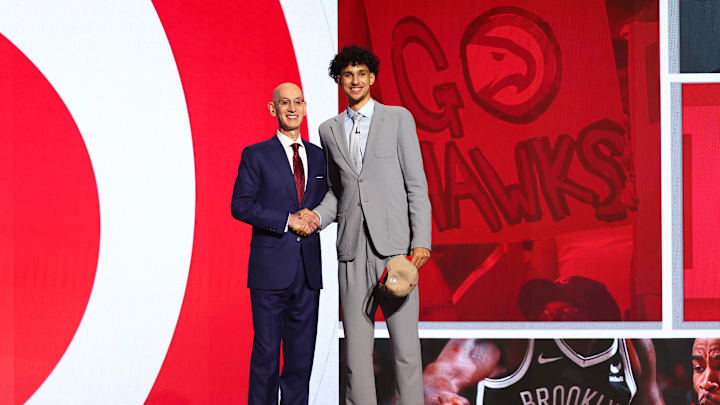With the conclusion of the 2024 NBA Draft, the new rookies have all been introduced to their new homes, and (most) have signed their first contracts. However, not all draft picks are created equal.
From the first overall pick to the last overall pick, the contracts for these stars of tomorrow differ greatly. From the amount of guaranteed money to the largest deal a rookie can sign for, it can be hard to wrap your head around these numbers.
Throw in the new Collective Bargaining Agreement, and you might need a helping hand to absorb it all. Thankfully, we're here to do just that.
The rookie wage scale
The rookie wage scale is the reason you don't see NBA rookies sign for absurd amounts of money and extra long-term contracts anymore. Each first-round draft slot has an assigned rookie-scale figure that's based on the salary cap. The rookie wage scale also only applies to the first 30 players selected.
Detailed by Sports Illustrated, the rookie wage scale was implemented in 1995 after veterans began to express displeasure that unproven rookies had higher salaries than league vets. (The nail in the coffin was the year prior, in 1994, when Glenn Robinson signed a 10-year, $68 million rookie contract.)
Changes were made swiftly thereafter, and rookies now have a limit on their starting salary.
The no. 1 overall pick's starting salary
Every year, the No. 1 overall pick seems to be making more money. This year is no exception. Zaccaharie Risacher—the Frenchman selected first overall by the Atlanta Hawks—just signed a four year, $57 million deal. He will make $12.6 million his rookie season, comparable to a number of NBA role players.
For reference, the 2023 No. 1 overall pick, Victor Wembanyama, had a rookie salary of $12.2 million. While the 2022 No. 1 overall pick, Paolo Banchero, was paid $11.1 million his first year.
The rest of the first round
After the first overall pick, a rookie's starting salary can differ greatly. Of course, the lottery is where most of the major money is, but the difference from the second overall pick to the 15th pick is still staggering.
The second overall pick, Alex Sarr, will make $11.2 million his rookie year; Kel'el Ware (the last pick in the lottery at no. 15 will make $4.6 million.
Outside of the lottery, the guaranteed money for these contracts begins to dip more. Between the 16th and 30th overall pick, the starting salary ranges from $4 million to $2.5 million.
The second round
The rookie wage scale does not apply to second round picks. However, the 2023 Collective Bargaining Agreement added a second-round pick exception clause, which essentially gives teams more freedom to sign players to multi-year deals without having to worry about creating more cap space.
Players like Tyler Kolek (selected by the New York Knicks with the 34th overall pick) just signed a deal worth $9 million over four years. The first three years are guaranteed with the fourth being a player option. Johnny Furphy (the 35th overall pick) signed a similar deal worth roughly $8.6 million.
However, not every second-rounder receives contracts like these. Some only sign two-year guaranteed deals or get no guarantees altogether. Most sign two-way contracts that allow them to split their time between their NBA team and its G-League affiliate where they are paid a one-time salary for their services in both leagues.
